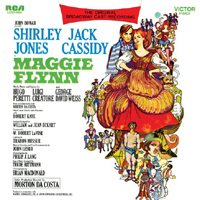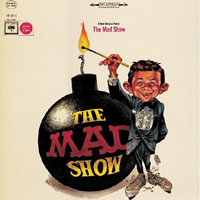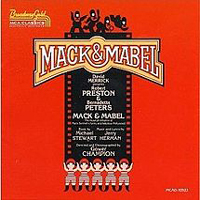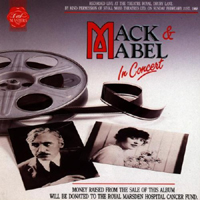 Original Broadway Cast, 1968 (RCA/DRG)
Original Broadway Cast, 1968 (RCA/DRG)  (3 / 5) Hardly remembered today, this show has had only one small-scale revival. It marked the return of Shirley Jones to Broadway, where she began her career in choruses before going on to star in the film versions of great musicals. Playing opposite her was her husband, Broadway veteran Jack Cassidy. Maggie Flynn was directed by Morton DaCosta, who had helmed such hits as Auntie Mame and The Music Man. The book, music, and lyrics were a collaboration of Hugo Peretti, Luigi Creatore, and George David Weiss. With encouraging out-of-town reviews, the musical seemed to have everything going for it, but it opened in New York to decidedly mixed notices. “The Thank-You Song” may seem to be a poor man’s “Do-Re-Mi,” but there’s more to Maggie Flynn than that number. Cleverly using the New York City draft riots of 1863 as background for a romance as well as a story of racial tolerance, the show has a tuneful score that made for a really fine cast album. “Why Can’t I Walk Away?” is powerfully sung by Cassidy as Maggie’s ex-husband Phineas. Whether delivering the lullaby “Pitter Patter” or the rousing “Mr. Clown,” Cassidy uses his voice to great advantage. As Maggie, who runs an orphanage for black children, Jones sings beautifully in the clear-as-abell soprano that helped make her a star, and she’s just as engaging when belting out the cheery “Nice Cold Morning” and the sly “I Wouldn’t Have You Any Other Way.” Among the orphans are future stars Stephanie Mills, Irene Cara, and Giancarlo Esposito; the group as a whole sounds glorious, especially in the chilling “The Game of War.” Robert R. Kaye is in fine voice as Colonel Farrady (Maggie’s beau). The title tune is introduced as a ballad for Cassidy and later turns into an up-tempo production number. The recording concludes with Jones singing “Mr. Clown” while Cassidy sings “Maggie Flynn,” the two songs fitting together perfectly. — Jeffrey Dunn
(3 / 5) Hardly remembered today, this show has had only one small-scale revival. It marked the return of Shirley Jones to Broadway, where she began her career in choruses before going on to star in the film versions of great musicals. Playing opposite her was her husband, Broadway veteran Jack Cassidy. Maggie Flynn was directed by Morton DaCosta, who had helmed such hits as Auntie Mame and The Music Man. The book, music, and lyrics were a collaboration of Hugo Peretti, Luigi Creatore, and George David Weiss. With encouraging out-of-town reviews, the musical seemed to have everything going for it, but it opened in New York to decidedly mixed notices. “The Thank-You Song” may seem to be a poor man’s “Do-Re-Mi,” but there’s more to Maggie Flynn than that number. Cleverly using the New York City draft riots of 1863 as background for a romance as well as a story of racial tolerance, the show has a tuneful score that made for a really fine cast album. “Why Can’t I Walk Away?” is powerfully sung by Cassidy as Maggie’s ex-husband Phineas. Whether delivering the lullaby “Pitter Patter” or the rousing “Mr. Clown,” Cassidy uses his voice to great advantage. As Maggie, who runs an orphanage for black children, Jones sings beautifully in the clear-as-abell soprano that helped make her a star, and she’s just as engaging when belting out the cheery “Nice Cold Morning” and the sly “I Wouldn’t Have You Any Other Way.” Among the orphans are future stars Stephanie Mills, Irene Cara, and Giancarlo Esposito; the group as a whole sounds glorious, especially in the chilling “The Game of War.” Robert R. Kaye is in fine voice as Colonel Farrady (Maggie’s beau). The title tune is introduced as a ballad for Cassidy and later turns into an up-tempo production number. The recording concludes with Jones singing “Mr. Clown” while Cassidy sings “Maggie Flynn,” the two songs fitting together perfectly. — Jeffrey Dunn
Category Archives: L-M
Magdalena
 New York Concert Cast, 1988 (CBS)
New York Concert Cast, 1988 (CBS)  (4 / 5) This is a musically adventurous, complex, and unruly Colombian stew by Heitor Villa-Lobos. The show was a flop on Broadway in 1948, but an admired one that was brought back decades later in a Lincoln Center concert version. The melodies, harmonies, and intricate rhythms of Magdalena sound like no other Broadway score, and the composer’s use of contrapuntal rhythms and strains — a player piano in the middle of a priest’s reverie, a pagan uprising during a state ceremony — is as sophisticated as in any opera. His orchestrations are dazzling, too, combining South American folk motifs with the sounds of late’40s Broadway. Unfortunately, the story that librettist Homer Curran and lyricists Robert Wright and George Forrest concocted is incomprehensible and annoyingly pious; the dull, religious heroine triumphs, but the fun-loving heathens have the best material. Some of the ballads and recitatives are faux-naif and bogus, but if you can endure those failings, you’ll be rewarded with a lavish, well-sung musical presentation based on the Lincoln Center concert. The witty “Food for Thought” lyrics, trilled to perfection by villainess Judy Kaye, and her later “Piece de Resistance”stand out. There’s also fine work from George Rose in one of his last roles, hamming it up lustily as a corrupt general. The romantic leads, Faith Esham and Kevin Gray, seem a little pallid by comparison, but they’re unfairly weighted down by all that shallow dialogue. Evans Haile conducts an enormous orchestra and chorus masterfully, and the flow of imaginative Villa-Lobos music is unending. A special nod to percussionist Patrick Smith, who is probably recuperating still. — Marc Miller
(4 / 5) This is a musically adventurous, complex, and unruly Colombian stew by Heitor Villa-Lobos. The show was a flop on Broadway in 1948, but an admired one that was brought back decades later in a Lincoln Center concert version. The melodies, harmonies, and intricate rhythms of Magdalena sound like no other Broadway score, and the composer’s use of contrapuntal rhythms and strains — a player piano in the middle of a priest’s reverie, a pagan uprising during a state ceremony — is as sophisticated as in any opera. His orchestrations are dazzling, too, combining South American folk motifs with the sounds of late’40s Broadway. Unfortunately, the story that librettist Homer Curran and lyricists Robert Wright and George Forrest concocted is incomprehensible and annoyingly pious; the dull, religious heroine triumphs, but the fun-loving heathens have the best material. Some of the ballads and recitatives are faux-naif and bogus, but if you can endure those failings, you’ll be rewarded with a lavish, well-sung musical presentation based on the Lincoln Center concert. The witty “Food for Thought” lyrics, trilled to perfection by villainess Judy Kaye, and her later “Piece de Resistance”stand out. There’s also fine work from George Rose in one of his last roles, hamming it up lustily as a corrupt general. The romantic leads, Faith Esham and Kevin Gray, seem a little pallid by comparison, but they’re unfairly weighted down by all that shallow dialogue. Evans Haile conducts an enormous orchestra and chorus masterfully, and the flow of imaginative Villa-Lobos music is unending. A special nod to percussionist Patrick Smith, who is probably recuperating still. — Marc Miller
The Mad Show
 Original Broadway Cast, 1966 (Columbia/DRG)
Original Broadway Cast, 1966 (Columbia/DRG)  (4 / 5) Marshall Barer was an unsung genius lyricist of the musical theater; his output was slight in terms of quantity, but he could write a ballad or comic song with a felicity equal to anyone in the field. The Mad Show, a reunion with his Once Upon a Mattress collaborator Mary Rodgers, yielded one of the funniest recordings in cast album history. Of course, it helps if you’re tuned in to the anarchic (and New York Jewish) humor of Mad magazine. The excellence of the revue, the unity of its components, and its terrific cast all shine through on the recording. Here are Linda Lavin, JoAnne Worley, MacIntyre Dixon, Richard Libertini, and Paul Sand in the show that propelled their long, distinguished careers. A highlight of the album is a non-Barer song, “The Boy From,” which all good musical comedy queens (err, fans) know was credited to Rodgers and “Esteban Ria Nido” — a pseudonym for Stephen Sondheim. The Mad Show ran for almost nine hundred performances. Unfortunately, when the show was released for production by regional groups, it was in a bowdlerized version. To add insult to injury, the recording wasn’t issued on CD until 2005, when DRG happily remedied that situation. — Ken Bloom
(4 / 5) Marshall Barer was an unsung genius lyricist of the musical theater; his output was slight in terms of quantity, but he could write a ballad or comic song with a felicity equal to anyone in the field. The Mad Show, a reunion with his Once Upon a Mattress collaborator Mary Rodgers, yielded one of the funniest recordings in cast album history. Of course, it helps if you’re tuned in to the anarchic (and New York Jewish) humor of Mad magazine. The excellence of the revue, the unity of its components, and its terrific cast all shine through on the recording. Here are Linda Lavin, JoAnne Worley, MacIntyre Dixon, Richard Libertini, and Paul Sand in the show that propelled their long, distinguished careers. A highlight of the album is a non-Barer song, “The Boy From,” which all good musical comedy queens (err, fans) know was credited to Rodgers and “Esteban Ria Nido” — a pseudonym for Stephen Sondheim. The Mad Show ran for almost nine hundred performances. Unfortunately, when the show was released for production by regional groups, it was in a bowdlerized version. To add insult to injury, the recording wasn’t issued on CD until 2005, when DRG happily remedied that situation. — Ken Bloom
Mack & Mabel
 Original Broadway Cast, 1974 (ABC/MCA)
Original Broadway Cast, 1974 (ABC/MCA)  (4 / 5) This beloved flop starred Robert Preston as silent-movie pioneer Mack Sennett and Bernadette Peters as his leading lady/lover, Mabel Normand. In spite of numerous revisions and revivals, the show never works. Michael Stewart’s downbeat book tells the story of a failed romance ending with Normand’s early death, while Jerry Herman’s witty, hooray-for-Hollywood songs belong to another musical altogether. The promised cocktail of tough humor and glossy tears is, in fact, a melange of unpalatable opposites. Nevertheless, it’s a hell of a score that provides a deluxe showcase for two of Broadway’s greatest stars. Preston’s gritty singing is ideally suited to the clever lyrics of “Movies Were Movies,” “Hundreds of Girls,” and “My Heart Leaps Up,” all of which layout Sennett’s philosophy of filmmaking. Peters’ Betty Boop-style belt is perfect in the galvanizing “Look What Happened to Mabel,” the furious “Wherever He Ain’t,” and the wounded torch song “Time Heals Everything.” Both stars score in different versions of the ballad “I Won’t Send Roses.” Other pluses include Lisa Kirk belting her way through the vivacious “Big Time” and “Tap Your Troubles Away,” as well as the inevitable Herman salute to the female star, “When Mabel Comes in the Room.” All of the melodies sparkle in Philip J. Lang’s orchestrations. This is a classic case of a show album that outclasses the show itself. — David Barbour
(4 / 5) This beloved flop starred Robert Preston as silent-movie pioneer Mack Sennett and Bernadette Peters as his leading lady/lover, Mabel Normand. In spite of numerous revisions and revivals, the show never works. Michael Stewart’s downbeat book tells the story of a failed romance ending with Normand’s early death, while Jerry Herman’s witty, hooray-for-Hollywood songs belong to another musical altogether. The promised cocktail of tough humor and glossy tears is, in fact, a melange of unpalatable opposites. Nevertheless, it’s a hell of a score that provides a deluxe showcase for two of Broadway’s greatest stars. Preston’s gritty singing is ideally suited to the clever lyrics of “Movies Were Movies,” “Hundreds of Girls,” and “My Heart Leaps Up,” all of which layout Sennett’s philosophy of filmmaking. Peters’ Betty Boop-style belt is perfect in the galvanizing “Look What Happened to Mabel,” the furious “Wherever He Ain’t,” and the wounded torch song “Time Heals Everything.” Both stars score in different versions of the ballad “I Won’t Send Roses.” Other pluses include Lisa Kirk belting her way through the vivacious “Big Time” and “Tap Your Troubles Away,” as well as the inevitable Herman salute to the female star, “When Mabel Comes in the Room.” All of the melodies sparkle in Philip J. Lang’s orchestrations. This is a classic case of a show album that outclasses the show itself. — David Barbour
 London Concert Cast, 1988 (First Night)
London Concert Cast, 1988 (First Night)  (2 / 5) This live recording of a concert of songs from Mack & Mabel has George Hearn and Denis Quilley lending their big voices to Mack’s songs, Debbie Shapiro Gravitte walloping the daylights out of “Big Time” and “Wherever He Ain’t,” Georgia Brown’s eccentric but touching version of “Time Heals Everything,” and Tommy Tune’s ebullient “Tap Your Troubles Away.” Debits include the replacement of “My Heart Leaps Up,” Mack’s tribute to the Keystone Kops, with the inferior “Hit ‘Em on the Head.” Jerry Herman narrates. — D.B.
(2 / 5) This live recording of a concert of songs from Mack & Mabel has George Hearn and Denis Quilley lending their big voices to Mack’s songs, Debbie Shapiro Gravitte walloping the daylights out of “Big Time” and “Wherever He Ain’t,” Georgia Brown’s eccentric but touching version of “Time Heals Everything,” and Tommy Tune’s ebullient “Tap Your Troubles Away.” Debits include the replacement of “My Heart Leaps Up,” Mack’s tribute to the Keystone Kops, with the inferior “Hit ‘Em on the Head.” Jerry Herman narrates. — D.B.
 Original London Cast, 1995 (Angel)
Original London Cast, 1995 (Angel)  (3 / 5) Although the leads are not ideal, this recording contains plenty of material not found on the Broadway album, including both act finales, an entr’acte, some reprises, and a title song that uses the melody of “Look What Happened to Mabel.” Howard McGillin is vocally overqualified as Mack; in “I Won’t Send Roses,” he laments the lack of romance in his soul in a voice that throbs with feeling. Caroline O’Connor as Mabel sounds eerily like Bernadette Peters (or an impersonator of her). Still, McGillin makes a very good case for “Hit ‘Em on the Head,” and O’Connor is appealing throughout. Kathryn Evans provides lusty renditions of “Big Time” and “Tap Your Troubles Away.” And, if anything, Larry Blank’s revisions of Philip ]. Lang’s orchestrations improve upon the originals. — D.B.
(3 / 5) Although the leads are not ideal, this recording contains plenty of material not found on the Broadway album, including both act finales, an entr’acte, some reprises, and a title song that uses the melody of “Look What Happened to Mabel.” Howard McGillin is vocally overqualified as Mack; in “I Won’t Send Roses,” he laments the lack of romance in his soul in a voice that throbs with feeling. Caroline O’Connor as Mabel sounds eerily like Bernadette Peters (or an impersonator of her). Still, McGillin makes a very good case for “Hit ‘Em on the Head,” and O’Connor is appealing throughout. Kathryn Evans provides lusty renditions of “Big Time” and “Tap Your Troubles Away.” And, if anything, Larry Blank’s revisions of Philip ]. Lang’s orchestrations improve upon the originals. — D.B.

